POSHAN MAAH Awareness Drivefor Adolescents and Pregnant and LactatingMothers
- Sandeep Bansal

- Nov 13, 2024
- 4 min read
Conducted by: Humanitarian Vision Foundation
Collaboration with: Department of Social Welfare, Women and Child Development, Chandigarh Administration
Duration: September 2024 (Nutrition Month - POSHAN MAAH)
Target Group: Adolescents and Pregnant and Lactating Mothers
Location: Anganwadi Centers, Chandigarh

Executive Summary
In September 2024, as part of the initiative POSHAN MAAH (Nutrition Month), the Humanitarian Vision Foundation joined forces with the Department of Social Welfare, Women and Child Development of the Chandigarh Administration to implement a series of awareness drives. These drives specifically targeted the nutritional and hygiene needs of adolescents, pregnant women, and lactating mothers, recognizing the critical role these groups play in the health of future generations.
The program consisted of six informative sessions held at various Anganwadi Centers throughout Chandigarh which included the following locations Bapudham Colony, Manimajra Colony, Indra Colony, Mouli Colony, Maloya Colony . Each session was designed with the aim of raising awareness about the importance of nutrition and hygiene among these essential demographic groups. The structure of the sessions was carefully crafted to empower participants with crucial knowledge regarding balanced diets, the significance of essential nutrients, and the proper hygiene practices that are vital for adolescent, maternal and child health.
During the sessions, participants engaged in dynamic discussions and interactive activities that facilitated deeper understanding and practical application of the concepts presented. Topics such as meal planning were explored, allowing participants to learn how to create nutritious meals within their budget. Safe food handling practices were also emphasised to prevent foodborne illnesses, which can pose significant risks. Additionally, personal hygiene practices were addressed, underscoring their importance in maintaining overall health and preventing infections.
The program fostered a supportive community environment, encouraging participants to share their experiences and insights. This collaboration among peers not only enhanced learning but also built a network of support that participants could rely on in their daily lives.
By addressing both nutritional needs and hygiene practices, these sessions served a dual purpose: they not only heightened awareness about the importance of these topics but also motivated participants to adopt healthier lifestyles. The overall impact of the initiative contributed significantly to improved health outcomes for mothers and their children, paving the way for a healthier future for families in Chandigarh.

Objectives
To enhance knowledge about nutritional requirements and healthy practices among adolescents and mothers.
To promote awareness of maternal and child health issues.
To encourage community support and shared learning regarding nutrition
and hygiene
To bring out an attitude and behaviour change in the audience.
Methodology

Session Structure
The awareness drive consisted of six structured sessions, each lasting two hours. The content of the sessions included:
1. Introduction to Nutrition
Overview of essential nutrients.
Recommended dietary guidelines for menstruators, pregnant and lactating women.
2. Meal Planning and Healthy Eating
Techniques for planning balanced meals.
Budget-friendly nutritious meal ideas.
3. Hygiene Practices
Importance of personal and food hygiene.
Safe food handling techniques.
4. Managing Common Health Issues
Nutritional solutions for common health issues.
Guidance on when to seek medical help.
5. Mental Well-being and Nutrition
The connection between nutrition and mental health.
Stress management techniques for mothers.
6. Community Support and Resources
Building local support networks.
Available health services and resources
Target Audience
The primary beneficiaries were:
Adolescents
Pregnant women
Lactating mothers
Session Highlights
Participation: Each session saw active engagement from 50-60 participants promoting a supportive atmosphere for learning.
Interactive Activities: Sessions included discussions, demonstrations, and hands-on exercises to ensure participants could apply the knowledge gained. Various activities were conducted which involved preparing healthy recipes that could replace junk food, Games focussing on the myths related to menstruation, etc. Activities involving being an aware consumer were conducted where the participants were asked to understand the nutritional value and ingredients along with the manufacturing and expiry date to create a behaviour change wherein they are able to be more aware as they consume market products.
Healthy Snacking: Healthy snacks were distributed to the participants which included Makhanas, Sattu, Lassi, Protein bars and cookies, whole wheat muffins in order to motivate them to switch their diets to healthy snacking.
Outcomes
Community Cohesion: The initiative strengthened community ties, encouraging adolescents and mothers to connect and share experiences and advice.
Future Interest: Many participants expressed a desire for additional sessions and resources, reflecting the initiative's positive impact.
Increased Awareness: The level of participation and questions raised during the sessions showed a significant increase in participants’ understanding of nutrition and hygiene practices.
Community Building: The initiative fostered connections among participants, encouraging ongoing support and information sharing.

Conclusion
The POSHAN MAAH awareness drive conducted by the Humanitarian Vision
Foundation in partnership with the Department of Social Welfare, Women and Child
Development was a successful initiative aimed at improving nutritional awareness
among adolescents and pregnant and lactating mothers. The program not only
disseminated vital health information but also fostered community engagement and
support. Beyond the dissemination of health information, the awareness drive
significantly fostered community engagement and support. The interactive nature of
the sessions encouraged participants to share their experiences, ask questions, and
learn from one another. This sense of community is invaluable, as it creates an
environment where individuals feel supported in their health journeys. The network
established among participants can lead to ongoing discussions and shared
resources, helping to sustain the positive impacts of the initiative long after the
sessions have concluded.
However, while the program achieved notable success, continued efforts are essential
to build on this momentum and address emerging health needs. As the landscape of
nutritional challenges evolves—affected by factors such as socioeconomic changes,
lifestyle shifts, and evolving health guidelines—there is a need for ongoing education
and support. Future initiatives could focus on more specialised topics, such as
mental health, family planning, and chronic disease management, further enriching
the knowledge base of the community.
In summary, the POSHAN MAAH awareness drive was a significant step forward in
improving nutritional awareness and fostering a supportive community among
adolescents and mothers. By continuing to prioritise education and engagement,
stakeholders can ensure that the community remains resilient and equipped to tackle
ongoing and emerging health challenges.

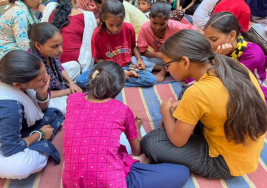
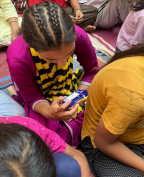
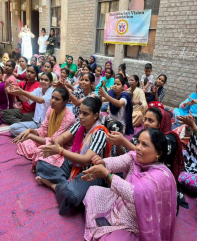

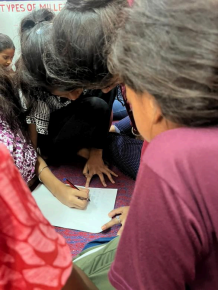
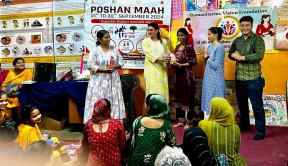






Comments